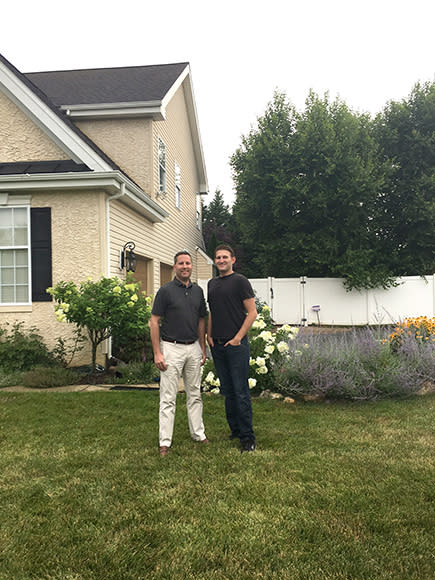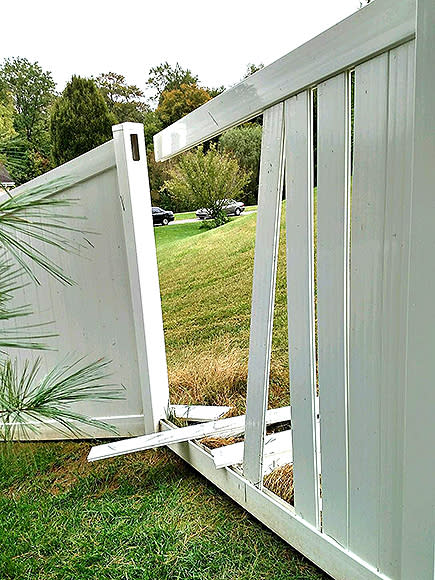A Same-Sex Couple Faces Anti-Gay Vandalism as They Fight 'Devastating' Lawsuit from Neighbors
Keith Davis and David Ruth couldn't wait to move their family into their new home.
"When we drove through the neighborhood, we loved everything," says Davis, 36, who bought his home in Avondale, Pennsylvania, with his partner in October 2014.
Before moving in, the couple of eight years spent $70,000 and over two months renovating. The landscape, electrical and septic work went off without a hitch, but a neighbor took umbrage when a surveyor was seen taking measurements for a fence the family intended to have installed.
"A lot of other homes in the neighborhood have fences, so at the time I thought he was just upset that my property line went all the way up to his house," Davis tells PEOPLE. "He insisted that the builder had said that a fence would not be built, but our realtor had no record of a homeowner's association or any builder agreement. We even asked the zoning office and they said that as long as the fence wasn't higher than 6 ft. tall, we didn't need any permits."
The installation of the fence took over a week but it wasn't until the last day of the process that Davis was contacted by a neighbor who was part of the committee that had dictated the neighborhood rules the first neighbor had mentioned.
"I told him the fence couldn't be un-installed and he was understanding," says Davis. "He wanted to work on changing the wording of the document to allow for my fence."
Feeling that the fence issues were behind them, Davis and Ruth moved the two boys in their care – who are Ruth's nephews – into the home just before Christmas 2014.

Shortly after moving in, Davis was working in his garage when a welcoming couple, the Carpenters, came by to introduce themselves.
"They brought a gift card and actually told me the fence was gorgeous," says Davis. "We were in the middle of a conversation and David comes out and I introduce him as my partner and let them know we have two small children and that we're happy to be in the neighborhood. They finish the conversation quickly and off they go."
Davis says he didn't think anything of the other couple's abrupt departure: "I just figured they had to get home," he recalls.
But the response to Davis and Ruth's relationship was perhaps an early signal of what was to come. In the ensuing months, the battle over the fence escalated, and Davis and Ruth endured shocking hate speech and alleged treatment they never expected.
A Lawsuit and Anti-Gay Vandalism
A week after the neighbors came by, Davis got a text from Ryan Carpenter, who had originally told him they would work to change the neighborhood document.
"Mr. Carpenter...told Mr. Davis the fence had to come down," reads the decision written by Judge Jeffrey R. Sommer, who eventually heard arguments from both sides after two families filed a lawsuit against Ruth and Davis in March 2015. "In conversations, Mr. Davis offered to [pay to put trees along the side of the fence] that faced the Carpenter property. This was unacceptable to Mr. Carpenter. There would be no compromise."
That May, Davis and Ruth received a letter from Carpenter stating that the security lights that Davis and Ruth had installed were a "nuisance" and should be removed immediately.
Not wanting to ruffle any more feathers, the couple turned the lights off, leaving their property dark in the evenings.
Three days later, Davis was pulling his car out in preparation for taking the boys, now 10 and 13, to summer camp when he saw hate speech spray painted on his garage door.
"I was just shocked. I couldn't believe it," says Davis, who raised both garage doors before bringing his kids out of the house. "It was awful to see that, but my main concern was to make sure the kids didn't see it."
Davis believes it was no coincidence that he was asked to remove his security lights just days before the vandalism.
Judge Sommer wrote in his declaration that "there is no evidence Carpenter knew of or was in any way involved in the spray-painting" but it was noted that Carpenter "did acknowledge that this lawsuit has become 'personal.' "
Davis and Ruth installed a security system but decided to take their family on vacation to get away from the strife. They asked their next door neighbors, who had recently moved in and were not a part of the suit, to keep an eye on their property.
"A couple of weeks after we left, we got a text from them saying that our security system sensors had been ripped up," says Davis. "And then someone smashed up the fence. We spent thousands replacing the security system and the fixing the fence."

"Mr. Carpenter also found other things about Mr. Davis and/or his partner...and their children," reads Judge Sommer's decision. "Mr. Carpenter testified that the Davis/Ruth dogs would bark. When this occured, Mr. Carpenter would stand on his deck and yell at the dogs. Mr. Carpenter acknowledged that he would yell 'other things' which included homophobic slurs. It appeared unlikely to the Court that the homophobic slurs were directed at the dogs."
(Carpenter has yet to make himself available for comment to PEOPLE.)
Judge Cites Homophobia
"This case is not at all about a fence," Judge Sommer wrote of the lawsuit, which eventually grew to include five households among the plantiffs.
Davis says the suit has now cost him and his partner almost $80,000.
On top of that, Davis, who owns a company that installs electronic medical records systems, says that the stress and time-consuming nature of the lawsuit has lost him clients and upwards of $400,000 in business. He's taken a second job as a consultant to try and make ends meet. He and Ruth have also set up a GoFundMe page to get help with their legal fees.
"The five families that are suing us are all splitting the cost of their legal fees. We don't have that luxury," says Davis. "We've lost all of our savings. It's been devastating."
In June, after hearing a day of testimony, Sommer ruled in favor of Davis and Ruth, saying they can keep their fence and also install a pool they'd previously been denied by the committee of residents.
Sommer wrote that the committee appeared to selectively enforce the rules when convenient for its members, denying Ruth and Davis requests for things that other houses in the 26-home neighborhood had, including their fence.
"The Planitffs and their witnesses all appearred well-prepared and repeated, almost verbatim, the 'theme' of the case: 'I only wish to honor the document.' However, the evidentirary narrative which was developed both in direct and in cross examination belied the 'theme,' " reads Sommer's decision. "There is no doubt that once Mr. Davis' sexual orientation was discovered, the tenor of the neighborhood interactions changed."
But some of the neighbors say that's just not true.
"Most of my neighbors who were involved or weren't involved are just disgusted with the way this evolved into a homophobic thing," Frank Charlton, one of the neighbors who has sued Davis and Ruth, told NBC10. "It is about a fence. It was about a fence."
The neighbors' lawsuit, which was obtained by PEOPLE, claims the fence is out of compliance with the subdivision's declaration of covenants.
"Mr. Davis and Mr. Ruth chose to ignore the restrictions and the Declaration and installed the fence despite knowing that doing so would violate the terms of the Declaration," the lawsuit claims.
The suit claims the fence "is made of a material other than wood," which requires approval by the subdivision's Architectural Control Committee; that it "extends beyond the back tall of the property towards the front of the property;" that it is more than four feet tall, among other reasons.
"Most of the members of the community expressed that they did not approve of the fence," the suit claims.
Whatever the reason behind the lawsuit, Davis hopes that his neighbors choose not to appeal the judge's decision (their window to file an appeal closes at the end of the week, he says) and looks forward to the day his family can put the ordeal behind him.
"We're holding our breath until the end of the week," says Davis. "But I hope that we can finally provide the happy and safe home for our family that we thought we were getting when we moved in. That's all we've wanted all along."
With reporting by HARRIET SOKMENSUER
